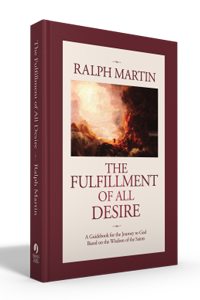By Ralph Martin
Ralph Martin is president of Renewal Ministries in Ann Arbor, Michigan and director of graduate programs in the new evangelization at Sacred Heart Seminary in Detroit. He is the author of the best-selling The Fulfillment of All Desire: A Guidebook for the Journey to God Based on the Wisdom of the Saints.

Jesus summed up his teaching in a startling and unambiguous call to His followers: “You, therefore, must be perfect, as your heavenly Father is perfect” (Matt 5:48). Perfect in purity of heart, perfect in compassion and love, perfect in obedience, perfect in conformity to the will of the Father, perfect in holiness—when we hear these words we can be understandably tempted to discouragement, thinking that perfection for us is impossible. And indeed, left to our own resources, it certainly is—just as impossible as it is for rich people to enter heaven, or for a man and a woman to remain faithful their whole lives in marriage. But with God, all things are possible, even our transformation.
John Paul II—and he himself may be among those recognized as a Doctor one day—in his prophetic interpretation of the events of the second half of the twentieth century and the beginning of the twenty-first, Novo Millennio Ineunte, points out that the Holy Spirit is again bringing to the forefront of the Church’s consciousness the conviction that these words of Jesus are indeed meant for every single one of us. He points out that the Jubilee of the year 2000 was simply the last phase of a period of preparation and renewal that had been going on for forty years, in order to equip the Church for the challenges of the new millennium.
Pope John Paul II speaks of three rediscoveries to which the Holy Spirit has led the Church beginning with the Second Vatican Council, which concluded in 1965. One of these rediscoveries is the rediscovery of the “universal call to holiness.”
Before we go much further in our examination of the spiritual journey, let’s take an initial look at what “holiness” really means. In the Book of Ephesians we read, “He chose us in him before the foundation of the world, that we should be holy and blameless before him” (Eph 1:4). To be holy is not primarily a matter of how many Rosaries we say or how much Christian activity we’re engaged in; it’s a matter of having our heart transformed into a heart of love. It is a matter of fulfilling the great commandments which sum up the whole law and the prophets: to love God and our neighbor, wholeheartedly. Or as Teresa of Avila puts it, holiness is a matter of bringing our wills into union with God’s will.
Thérèse of Lisieux expresses it very similarly: “Perfection consists in doing His will, in being what He wills us to be . . . who resists His grace in nothing.” As she said towards the very end of her life: “I do not desire to die more than to live; it is what He does that I love.”
We all probably know in some way that we’re called to holiness but perhaps struggle to respond. Feeling the challenge of the call and yet seeing the obstacles, it is easy to rationalize delaying or compromising and avoid a wholehearted and immediate response.
It is not uncommon, for example, to “pass the buck” to others whom we deem in a better position to respond wholeheartedly. Those of us who are Catholic lay people often look at our busy lives and sluggish hearts and suppose that priests and nuns are in a better position to respond to the call. After all, we may think to ourselves, that’s what we pay them for! We may think that when our kids are grown, or when we retire, or after a business crisis passes, or when we don’t have to care for ailing parents, or when we get a better job, or when we get married, or . . . that then we’ll be in a better position to respond.
Unfortunately, being a priest or nun doesn’t eliminate temptations to also “pass the buck.” With the reduction in numbers, it is understandably easy for priests and nuns to feel overwhelmed by their responsibilities and have such a busy pace of life that they might suppose that it’s the cloistered orders who are truly in a good position to respond wholeheartedly to the call to holiness.
But even in cloistered orders, it’s possible to rationalize and “pass the buck.” What with caring for guests, overseeing building renovations, attending monastic conferences, or making cheese, bread, or jams, it’s possible to suppose that it’s the hermit who really can respond wholeheartedly.
But even being a hermit doesn’t guarantee such a response. After all, hermits need to work out a rule of life, have meetings with superiors to review it, make sure their medical insurance is covering them properly, deal with internal and external distractions and temptations, and maybe even contribute to a newsletter for hermits!
What really holds us back from a wholehearted response to the call of Jesus, of Vatican II, of the repeated urgings of the Spirit, is not really the external circumstances of our lives, but the interior sluggishness of our hearts. We need to be clear that there will never be a better time or a better set of circumstances than now to respond wholeheartedly to the call to holiness. Who knows how much longer we’ll be alive on this earth? We don’t know how long we’ll live or what the future holds. Now is the acceptable time. The very things we think are obstacles are the very means God is giving us to draw us to depend more deeply on Him.
The source of all our unhappiness and misery is sin and its effects, and the sooner the purification of sin and its effects can take place in our life, the happier we will be and the better able to truly love others. Only then will we be able to enter into the purpose God has for our life. Truly, in this case, better sooner than later.
And finally, it’s important to realize that there is only one choice; either to undergo complete transformation and enter heaven, or be eternally separated from God in hell. There are only two ultimate destinations, and if we want to enter heaven we must be made ready for the sight of God. Holiness isn’t an “option.” There are only saints in heaven; total transformation is not an “option” for those interested in that sort of thing, but is essential for those who want to spend eternity with God: “Strive for peace with all men, and for the holiness without which no one will see the Lord" (Heb 12:14).
The whole purpose of our creation, the whole purpose of our redemption is so that we may be fully united with God in every aspect of our being. We exist for union; we were created for union; we were redeemed for eternal union. The sooner we’re transformed the happier and the more “fulfilled” we’ll be. The only way to the fulfillment of all desire is to undertake and complete the journey to God.
You Might Also Like

Ralph Martin's modern classic The Fulfillment of All Desire is a perennial best-seller. Drawing upon the teaching of seven acknowledged Spiritual Doctors of the Church, he presents an in-depth study of the journey to God.

